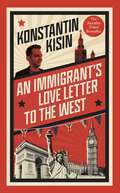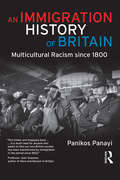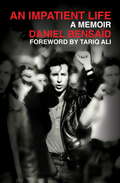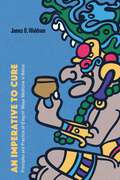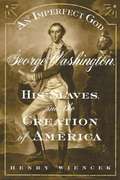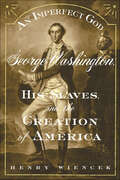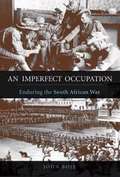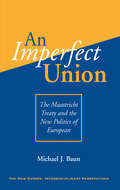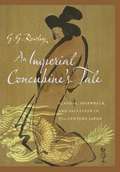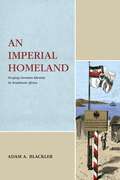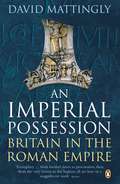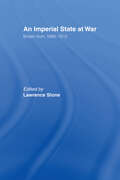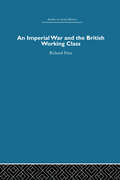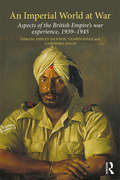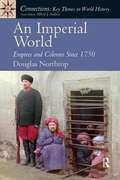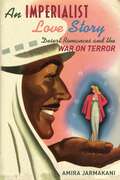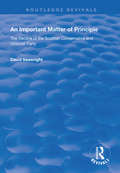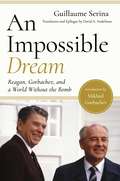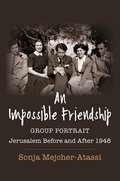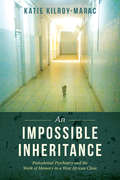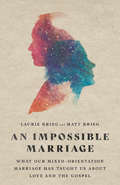- Table View
- List View
An Immigrant's Love Letter to the West
by Konstantin KisinFor all of the West's failings - terrible food, cold weather, and questionable politicians with funny hair to name a few - it has its upsides. Konstantin would know. Growing up in the Soviet Union, he experienced first-hand the horrors of a socialist paradise gone wrong, having lived in extreme poverty with little access to even the most basic of necessities. It wasn't until he moved to the UK that Kisin found himself thriving in an open and tolerant society, receiving countless opportunities he would never have had otherwise.Funny, provocative and unswervingly perceptive, An Immigrant's Love letter to the West interrogates the developing sense of self-loathing the Western sphere has adopted and offers an alternative perspective. Exploring race politics, free speech, immigration and more, Kisin argues that wrongdoing and guilt need not pervade how we feel about the West - and Britain - today, and that despite all its ups and downs, it remains one of the best places to live in the world.After all, if an immigrant can't publicly profess their appreciation for this country, who can?
An Immigrant's Love Letter to the West
by Konstantin KisinFor all of the West's failings - terrible food, cold weather, and questionable politicians with funny hair to name a few - it has its upsides. Konstantin would know. Growing up in the Soviet Union, he experienced first-hand the horrors of a socialist paradise gone wrong, having lived in extreme poverty with little access to even the most basic of necessities. It wasn't until he moved to the UK that Kisin found himself thriving in an open and tolerant society, receiving countless opportunities he would never have had otherwise.Funny, provocative and unswervingly perceptive, An Immigrant's Love letter to the West interrogates the developing sense of self-loathing the Western sphere has adopted and offers an alternative perspective. Exploring race politics, free speech, immigration and more, Kisin argues that wrongdoing and guilt need not pervade how we feel about the West - and Britain - today, and that despite all its ups and downs, it remains one of the best places to live in the world.After all, if an immigrant can't publicly profess their appreciation for this country, who can?
An Immigrant's Love Letter to the West (Karen Pirie #4)
by Konstantin KisinTHE SUNDAY TIMES BESTSELLER'A lively and spirited book' DOUGLAS MURRAY'A paean to the freedom and dignity that many in the West take for granted' PETER BOGHOSSIAN'A cool, steady but urgent message that we should value and protect what we have' SPIKED'Kisin's book [has] a powerful moral quality that makes it worth reading' SUNDAY TIMESFor all of the West's failings - terrible food, cold weather, and questionable politicians with funny hair to name a few - it has its upsides. Konstantin would know. Growing up in the Soviet Union, he experienced first-hand the horrors of a socialist paradise gone wrong, having lived in extreme poverty with little access to even the most basic of necessities. It wasn't until he moved to the UK that Kisin found himself thriving in an open and tolerant society, receiving countless opportunities he would never have had otherwise.Funny, provocative and unswervingly perceptive, An Immigrant's Love letter to the West interrogates the developing sense of self-loathing the Western sphere has adopted and offers an alternative perspective. Exploring race politics, free speech, immigration and more, Kisin argues that wrongdoing and guilt need not pervade how we feel about the West - and Britain - today, and that despite all its ups and downs, it remains one of the best places to live in the world.After all, if an immigrant can't publicly profess their appreciation for this country, who can?
An Immigration History of Britain: Multicultural Racism since 1800
by Panikos PanayiImmigration, ethnicity, multiculturalism and racism have become part of daily discourse in Britain in recent decades – yet, far from being new, these phenomena have characterised British life since the 19th century. While the numbers of immigrants increased after the Second World War, groups such as the Irish, Germans and East European Jews have been arriving, settling and impacting on British society from the Victorian period onwards. In this comprehensive and fascinating account, Panikos Panayi examines immigration as an ongoing process in which ethnic communities evolve as individuals choose whether to retain their ethnic identities and customs or to integrate and assimilate into wider British norms. Consequently, he tackles the contradictions in the history of immigration over the past two centuries: migration versus government control; migrant poverty versus social mobility; ethnic identity versus increasing Anglicisation; and, above all, racism versus multiculturalism. Providing an important historical context to contemporary debates, and taking into account the complexity and variety of individual experiences over time, this book demonstrates that no simple approach or theory can summarise the migrant experience in Britain.
An Impatient Life
by Tariq Ali Daniel BensaidIn the classic tradition of the philosopher-activist, Daniel Bensaid tells the story of a life deeply entwined with the history of both the French and the international Left. From his family bistro in a staunchly red neighborhood of Toulouse to the founding of the Jeunesses communistes revolutionnaires in the 1960s, from the joyous explosion of May 1968 to the painful experience of defeat in Latin America, from the re-reading of Marx to the "Marrano" trail, Bensaid relates a life of ideological and practical struggle in which he unflinchingly sought to understand capitalism without ever succumbing to its temptations.
An Imperative to Cure: Principles and Practice of Q'eqchi' Maya Medicine in Belize
by James B. WaldramJames B. Waldram&’s groundbreaking study, An Imperative to Cure: Principles and Practice of Q&’eqchi&’ Maya Medicine in Belize, explores how our understanding of Indigenous therapeutics changes if we view them as forms of &“medicine&” instead of &“healing.&” Bringing an innovative methodological approach based on fifteen years of ethnographic research, Waldram argues that Q&’eqchi&’ medical practitioners access an extensive body of empirical knowledge and personal clinical experience to diagnose, treat, and cure patients according to a coherent ontology and set of therapeutic principles. Not content to leave the elements of Q&’eqchi&’ cosmovision to the realm of the imaginary and beyond human reach, Q&’eqchi&’ practitioners conceptualize the world as essentially material and meta/material, consisting of complex but knowable forces that impact health and well-being in real and meaningful ways—forces with which Q&’eqchi&’ practitioners must engage to cure their patients.
An Imperfect God: George Washington, His Slaves, and the Creation of America
by Henry WiencekWhen George Washington wrote his will, he made the startling decision to set his slaves free; earlier he had said that holding slaves was his "only unavoidable subject of regret."
An Imperfect God: George Washington, His Slaves, and the Creation of America
by Henry WiencekAn Imperfect God is a major new biography of Washington, and the first to explore his engagement with American slaveryWhen George Washington wrote his will, he made the startling decision to set his slaves free; earlier he had said that holding slaves was his "only unavoidable subject of regret." In this groundbreaking work, Henry Wiencek explores the founding father's engagement with slavery at every stage of his life--as a Virginia planter, soldier, politician, president and statesman. Washington was born and raised among blacks and mixed-race people; he and his wife had blood ties to the slave community. Yet as a young man he bought and sold slaves without scruple, even raffled off children to collect debts (an incident ignored by earlier biographers). Then, on the Revolutionary battlefields where he commanded both black and white troops, Washington's attitudes began to change. He and the other framers enshrined slavery in the Constitution, but, Wiencek shows, even before he became president Washington had begun to see the system's evil. Wiencek's revelatory narrative, based on a meticulous examination of private papers, court records, and the voluminous Washington archives, documents for the first time the moral transformation culminating in Washington's determination to emancipate his slaves. He acted too late to keep the new republic from perpetuating slavery, but his repentance was genuine. And it was perhaps related to the possibility--as the oral history of Mount Vernon's slave descendants has long asserted--that a slave named West Ford was the son of George and a woman named Venus; Wiencek has new evidence that this could indeed have been true.George Washington's heroic stature as Father of Our Country is not diminished in this superb, nuanced portrait: now we see Washington in full as a man of his time and ahead of his time.
An Imperfect Occupation: Enduring the South African War
by John BojeThe South African War (1899-1902), also called the Boer War and Anglo-Boer War, began as a conventional conflict. It escalated into a savage irregular war fought between the two Boer republics and a British imperial force that adopted a scorched-earth policy and used concentration camps to break the will of Afrikaner patriots and Boer guerrillas. In An Imperfect Occupation , John Boje delves into the agonizing choices faced by Winburg district residents during the British occupation. Afrikaner men fought or evaded combat or collaborated; Afrikaner women fled over the veld or submitted to life in the camps; and black Africans weighed the life or death consequences of taking sides. Boje's sensitive analysis showcases the motives, actions, and reactions of Boers and Africans alike as initial British accommodation gave way to ruthlessness. Challenging notions of Boer unity and homogeneity, Boje illustrates the precarious tightrope of resistance, neutrality, and collaboration walked by people on all sides. He also reveals how the repercussions of the war's transformative effect on Afrikaner identity plays out in today's South Africa. Readable and compassionate, An Imperfect Occupation provides a dramatic account of the often overlooked aspects of one of the first "modern" wars.
An Imperfect Union: The Maastricht Treaty And The New Politics Of European Integration
by Michael J BaunExploring the politics of European integration, Michael Baun argues that the end of the Cold War and German unification have created a new set of geopolitical realities in Europe that have profoundly affected the nature and dynamics of European union. His primary focus is the high politics" of European integration after 1989, especially the role of the Franco-German relationship in the Maastricht Treaty process.Acknowledging the important roots of the treaty in economic and institutional developments prior to 1989, Baun argues that Maastricht principally can be understood as a response by the EU and its member states to German unification and the end of the cold war. In making this argument, he departs from more conventional neofunctionalist or institutionalist interpretations of European integration.After providing the historical background of developments before 1989, Baun weighs the decision to launch parallel intergovernmental conferences on monetary and political union in 1990 and describes in detail the negotiations and treaty outcomes in each of these areas. He then examines the difficult ratification of the Maastricht treaty in 1992-1993, in the face of growing popular opposition and economic and monetary instability. The book concludes with an analysis of the future prospects for European union in the post-Maastricht era, as the EU approaches its next major intergovernmental conference in 1996.
An Imperial Concubine's Tale
by G. G. RowleyJapan in the early seventeenth century was a wild place. Serial killers stalked the streets of Kyoto at night, while noblemen and women mingled freely at the imperial palace, drinking saké and watching kabuki dancing in the presence of the emperor's principal consort. Among these noblewomen was an imperial concubine named Nakanoin Nakako, who in 1609 became embroiled in a sex scandal involving both courtiers and young women in the emperor's service. As punishment, Nakako was banished to an island in the Pacific Ocean, but she never reached her destination. Instead, she was shipwrecked and spent fourteen years in a remote village on the Izu Peninsula, before being set free in an amnesty. Returning to Kyoto, Nakako began a new adventure: she entered a convent and became a Buddhist nun.Recounting the remarkable story of this resilient woman and the war-torn world in which she lived, G. G. Rowley investigates aristocratic family archives, village storehouses, and the records of imperial convents to re-create Nakako's life from beginning to end. She follows the banished concubine as she endures rural exile, receives an unexpected reprieve, and rediscovers herself as the abbess of a nunnery. As she unravels Nakako's unusual tale, Rowley also profiles the little-known lives of samurai women who sacrificed themselves on the fringes of the great battles that brought an end to more than a century of civil war. Written with keen insight and genuine affection, An Imperial Concubine's Tale tells the true story of a woman's extraordinary life in seventeenth-century Japan.
An Imperial Concubine's Tale: Scandal, Shipwreck, and Salvation in Seventeenth-Century Japan
by G. G. RowleyJapan in the early seventeenth century was a wild place. Serial killers stalked the streets of Kyoto at night, while noblemen and women mingled freely at the imperial palace, drinking saké and watching kabuki dancing in the presence of the emperor's principal consort. Among these noblewomen was an imperial concubine named Nakanoin Nakako, who in 1609 became embroiled in a sex scandal involving both courtiers and young women in the emperor's service. As punishment, Nakako was banished to an island in the Pacific Ocean, but she never reached her destination. Instead, she was shipwrecked and spent fourteen years in a remote village on the Izu Peninsula before she was finally allowed to return to Kyoto. In 1641, Nakako began a new adventure: she entered a convent and became a Buddhist nun.Recounting the remarkable story of this resilient woman and her war-torn world, G. G. Rowley investigates aristocratic family archives, village storehouses, and the records of imperial convents. She follows the banished concubine as she endures rural exile, receives an unexpected reprieve, and rediscovers herself as the abbess of a nunnery. While unraveling Nakako's unusual tale, Rowley also reveals the little-known lives of samurai women who sacrificed themselves on the fringes of the great battles that brought an end to more than a century of civil war. Written with keen insight and genuine affection, An Imperial Concubine's Tale tells the true story of a woman's extraordinary life in seventeenth-century Japan.
An Imperial Homeland: Forging German Identity in Southwest Africa (Max Kade Research Institute)
by Adam A. BlacklerAt the turn of the twentieth century, depictions of the colonized world were prevalent throughout the German metropole. Tobacco advertisements catered to the erotic gaze of imperial enthusiasts with images of Ovaherero girls, and youth magazines allowed children to escape into “exotic domains” where their imaginations could wander freely. While racist beliefs framed such narratives, the abundance of colonial imaginaries nevertheless compelled German citizens and settlers to contemplate the world beyond Europe as a part of their daily lives.An Imperial Homeland reorients our understanding of the relationship between imperial Germany and its empire in Southwest Africa (present-day Namibia). Colonialism had an especially significant effect on shared interpretations of the Heimat (home/homeland) ideal, a historically elusive perception that conveyed among Germans a sense of place through national peculiarities and local landmarks. Focusing on colonial encounters that took place between 1842 and 1915, Adam A. Blackler reveals how Africans confronted foreign rule and altered German national identity. As Blackler shows, once the façade of imperial fantasy gave way to colonial reality, German metropolitans and white settlers increasingly sought to fortify their presence in Africa using juridical and physical acts of violence, culminating in the first genocide of the twentieth century.Grounded in extensive archival research, An Imperial Homeland enriches our understanding of German identity, allowing us to see how a distant colony with diverse ecologies, peoples, and social dynamics grew into an extension of German memory and tradition. It will be of interest to German Studies scholars, particularly those interested in colonial Africa.
An Imperial Possession: Britain in the Roman Empire, 54 BC - AD 409 (Penguin History of Britain)
by David MattinglyPart of the Penguin History of Britain series, An Imperial Possession is the first major narrative history of Roman Britain for a generation. David Mattingly draws on a wealth of new findings and knowledge to cut through the myths and misunderstandings that so commonly surround our beliefs about this period. From the rebellious chiefs and druids who led native British resistance, to the experiences of the Roman military leaders in this remote, dangerous outpost of Europe, this book explores the reality of life in occupied Britain within the context of the shifting fortunes of the Roman Empire.
An Imperial State at War: Britain From 1689-1815
by Lawrence StoneThe study of eighteenth century history has been transformed by the writings of John Brewer, and most recently, with The Sinews of Power, he challenged the central concepts of British history. Brewer argues that the power of the British state increased dramatically when it was forced to pay the costs of war in defence of her growing empire. In An Imperial State at War, edited by Lawrence Stone (himself no stranger to controversy), the leading historians of the eighteenth century put the Brewer thesis under the spotlight. Like the Sinews of Power itself, this is a major advance in the study of Britain's first empire.
An Imperial War and the British Working Class: Working-Class Attitudes and Reactions to the Boer War, 1899-1902
by Richard PriceFirst published in 2006. Routledge is an imprint of Taylor & Francis, an informa company.
An Imperial World at War: The British Empire, 1939–45
by Ashley Jackson Yasmin Khan Gajendra SinghAt the start of the Second World War, Britain was at the height of its imperial power, and it is no surprise that it drew upon the global resources of the Empire once war had been declared. Whilst this international aspect of Britain’s war effort has been well-studied in relation to the military contribution of individual dominions and colonies, relatively little has been written about the Empire as a whole. As such, An Imperial World at War makes an important contribution to the historiography relating to the British Empire and its wartime experience. It argues that the war needs to be viewed in imperial terms, that the role of forces drawn from the Empire is poorly understood and that the war's impact on colonial societies is barely grasped at all in conventional accounts. Through a series of case studies, the volume demonstrates the fundamental role played by the Empire in Britain’s war effort and highlights some of the consequences for both Britain and its imperial territories.Themes include the recruitment and utilization of military formations drawn from imperial territories, the experience of British forces stationed overseas, the use of strategic bases located in the colonies, British policy in the Middle East and the challenge posed by growing American power, the occupation of enemy colonies and the enemy occupation of British colonies, colonial civil defence measures, financial support for the war effort supplied by the Empire, and the commemoration of the war. The Afterword anticipates a new, decentred history of the war that properly acknowledges the role and importance of people and places throughout the colonial and semi-colonial world.’ This volume emanates from a conference organized as part of the ‘Home Fronts of the Empire – Commonwealth’ project. The project was generously funded by the Arts and Humanities Research Council and led by Yasmin Khan and Ashley Jackson with Gajendra Singh as Postdoctoral Research Assistant.
An Imperial World: Empires and Colonies Since 1750
by Douglas NorthropThis text helps students understand world history by focusing on an issue that has profoundly shaped the modern world order: the establishment and collapse of global empires since 1750. An Imperial World uses a combination of primary documents and analytical essays, both tightly focused around four case studies: India, Africa, Asia, and the Americas. It examines the historical development of colonial systems and shows their enormous role in shaping the modern world order. It is meant to be thematic and suggestive, offering arguments and information to serve as a starting point for discussion and exploration.
An Imperialist Love Story: Desert Romances and the War on Terror
by Amira JarmakaniA curious figure stalks the pages of a distinct subset of mass-market romance novels, aptly called “desert romances.” Animalistic yet sensitive, dark and attractive, the desert prince or sheikh emanates manliness and raw, sexual power. In the years since September 11, 2001, the sheikh character has steadily risen in popularity in romance novels, even while depictions of Arab masculinity as backward and violent in nature have dominated the cultural landscape. An Imperialist Love Story contributes to the broader conversation about the legacy of orientalist representations of Arabs in Western popular culture. Combining close readings of novels, discursive analysis of blogs and forums, and interviews with authors, Jarmakani explores popular investments in the war on terror by examining the collisions between fantasy and reality in desert romances. Focusing on issues of security, freedom, and liberal multiculturalism, she foregrounds the role that desire plays in contemporary formations of U.S. imperialism. Drawing on transnational feminist theory and cultural studies, An Imperialist Love Story offers a radical reinterpretation of the war on terror, demonstrating romance to be a powerful framework for understanding how it works, and how it perseveres.
An Imperishable Heritage: A Study of Selected Works
by Stephen TownThe rehabilitation of British music began with Hubert Parry and Charles Villiers Stanford. Ralph Vaughan Williams assisted in its emancipation from continental models, while Gerald Finzi, Edmund Rubbra and George Dyson flourished in its independence. Stephen Town's survey of Choral Music of the English Musical Renaissance is rooted in close examination of selected works from these composers. Town collates the substantial secondary literature on these composers, and brings to bear his own study of the autograph manuscripts. The latter form an unparalleled record of compositional process and shed new light on the compositions as they have come down to us in their published and recorded form. This close study of the sources allows Town to identify for the first time instances of similarity and imitation, continuities and connections between the works.
An Important Matter of Principle: The Decline of the Scottish Conservative and Unionist Party (Routledge Revivals)
by David SeawrightFirst published in 1999, this book examines the dramatic decline of the Conservative Party in Scotland. In 1955 the party secured over 50 per cent of the Scottish vote. At the last election it won a mere 17 per cent of the vote, losing its representation at Westminster in the process. But, until the publication of this work and despite its importance, relatively little was known about why the Conservative Party had declined so precipitously in Scotland. Many of the explanations for the party’s decline had largely remained untested. These included that the party had lost its Protestant base, suffered for its opposition to devolution and become too right wing for a normally progressive Scottish electorate. Using a unique collection of survey data, this work casts doubt on all three claims. Thus, this book makes a major academic contribution and examines, what for the Scottish Unionists, was An Important Matter of Principle.
An Impossible Dream: Reagan, Gorbachev, And A World Without The Bomb
by Guillaume SerinaThe riveting untold story behind the meeting between Ronald Reagan and Mikhail Gorbachev in Reykjavik to stop the nuclear arms race. When Ronald Reagan and Mikhail Gorbachev sat down in Reykjavik in 1986, George Shultz, the American secretary of state at the time, said that it was “the poker game with the highest stakes ever played.” It was the last time the world had a chance to do away entirely with nuclear weapons. This is the behind-the-scenes story of this remarkable summit conference in the remote Icelandic capital. An Impossible Dream is the first exploration of recently-available archives of both sides—top-secret archives of the Kremlin and the personal papers of Mikhail Gorbachev, as well as the archives of Ronald Reagan. These chronicles, personal diaries and previously classified memoranda are deeply enriched by the personal reminiscences of many of the key players at this era.But above all, the stage is set with a personal and exclusive preface from Mikhail Gorbachev himself. An Impossible Dream is the deeply important examination of the present and the future. The hazards of the nuclear age are legion, from aging weapons to new software that is vulnerable to terrorist attacks. With elements of the Trump administration considering a unilateral abrogation of the intermediate range nuclear missile (INF) treaty, the roots of which were laid at Reykjavik. Serina lays out this pivotal moment in history clearly and dramatically in this landmark work, as the world stands poised on the edge of a potential new arms race.
An Impossible Friendship: Group Portrait, Jerusalem Before and After 1948 (Religion, Culture, and Public Life #47)
by Sonja Mejcher-AtassiIn Jerusalem, as World War II was coming to an end, an extraordinary circle of friends began to meet at the bar of the King David Hotel. This group of aspiring artists, writers, and intellectuals—among them Wolfgang Hildesheimer, Jabra Ibrahim Jabra, Sally Kassab, Walid Khalidi, and Rasha Salam, some of whom would go on to become acclaimed authors, scholars, and critics—came together across religious lines in a fleeting moment of possibility within a troubled history. What brought these Muslim, Jewish, and Christian friends together, and what became of them in the aftermath of 1948, the year of the creation of the State of Israel and the Palestinian Nakba?Sonja Mejcher-Atassi tells the story of this unlikely friendship and in so doing offers an intimate cultural and social history of Palestine in the critical postwar period. She vividly reconstructs the vanished social world of these protagonists, tracing the connections between the specificity of individual lives and the larger contexts in which they are embedded. In exploring this ecumenical friendship and its artistic, literary, and intellectual legacies, Mejcher-Atassi demonstrates how social biography can provide a picture of the past that is at once more inclusive and more personal. This group portrait, she argues, allows us to glimpse alternative possibilities that exist within and alongside the fraught history of Israel/Palestine. Bringing a remarkable era to life through archival research and nuanced interdisciplinary scholarship, An Impossible Friendship unearths prospects for historical reconciliation, solidarity, and justice.
An Impossible Inheritance: Postcolonial Psychiatry and the Work of Memory in a West African Clinic
by Katie Kilroy-MaracWeaving sound historical research with rich ethnographic insight, An Impossible Inheritance tells the story of the emergence, disavowal, and afterlife of a distinctive project in transcultural psychiatry initiated at the Fann Psychiatric Clinic in Dakar, Senegal during the 1960s and 1970s. Today’s clinic remains haunted by its past and Katie Kilroy-Marac brilliantly examines the complex forms of memory work undertaken by its affiliates over a sixty year period. Through stories such as that of the the ghost said to roam the clinic’s halls, the mysterious death of a young doctor sometimes attributed to witchcraft, and the spirit possession ceremonies that may have taken place in Fann’s courtyard, Kilroy-Marac argues that memory work is always an act of the imagination and a moral practice with unexpected temporal, affective, and political dimensions. By exploring how accounts about the Fann Psychiatric Clinic and its past speak to larger narratives of postcolonial and neoliberal transformation, An Impossible Inheritance examines the complex relationship between memory, history, and power within the institution and beyond.
An Impossible Marriage: What Our Mixed-Orientation Marriage Has Taught Us About Love and the Gospel
by Laurie Krieg Matt Krieg"People say our marriage is impossible." Laurie and Matt Krieg are in a mixed-orientation marriage: a marriage in which at least one partner's primary attraction isn't toward the gender of their spouse. In the Kriegs' case, Laurie is primarily attracted to women—and so is Matt. Some find the idea of mixed-orientation marriage bewildering or even offensive. But as the Kriegs have learned, nothing is impossible with God—and that's as true of their marriage as anyone else's. In An Impossible Marriage, the Kriegs tell their story: how they met and got married, the challenges and breakthroughs of their journey, and what they've learned about marriage along the way. Christianity teaches us that marriage is a picture of Jesus’ love for the church—and that's just as true in a mixed-orientation marriage as in a straight one. With vulnerability and wisdom, this book lays out an engaging picture of marriage in all its pain and beauty. It's a picture that points us, over and over again, to the love and grace of Jesus—as marriage was always meant to do.
